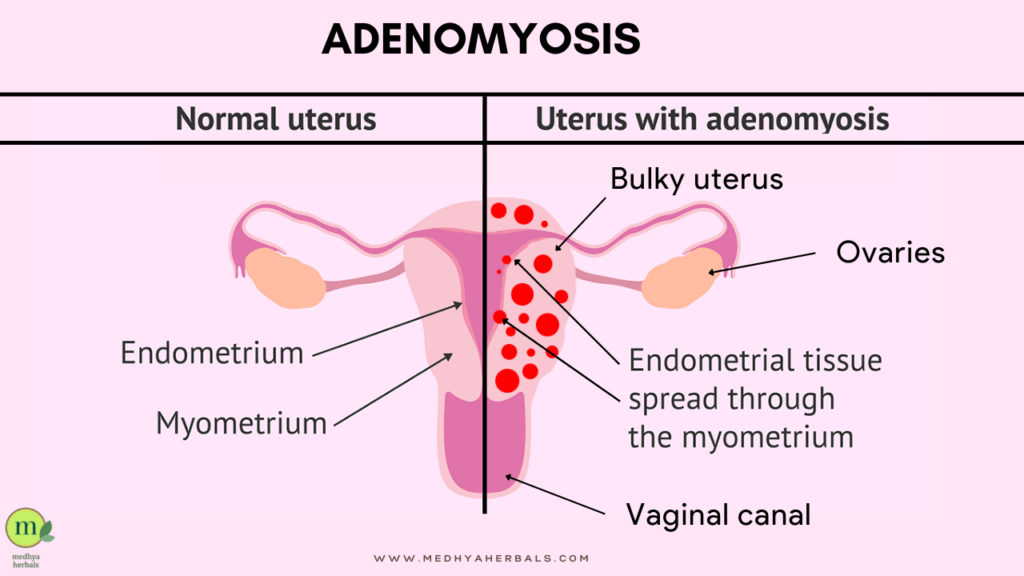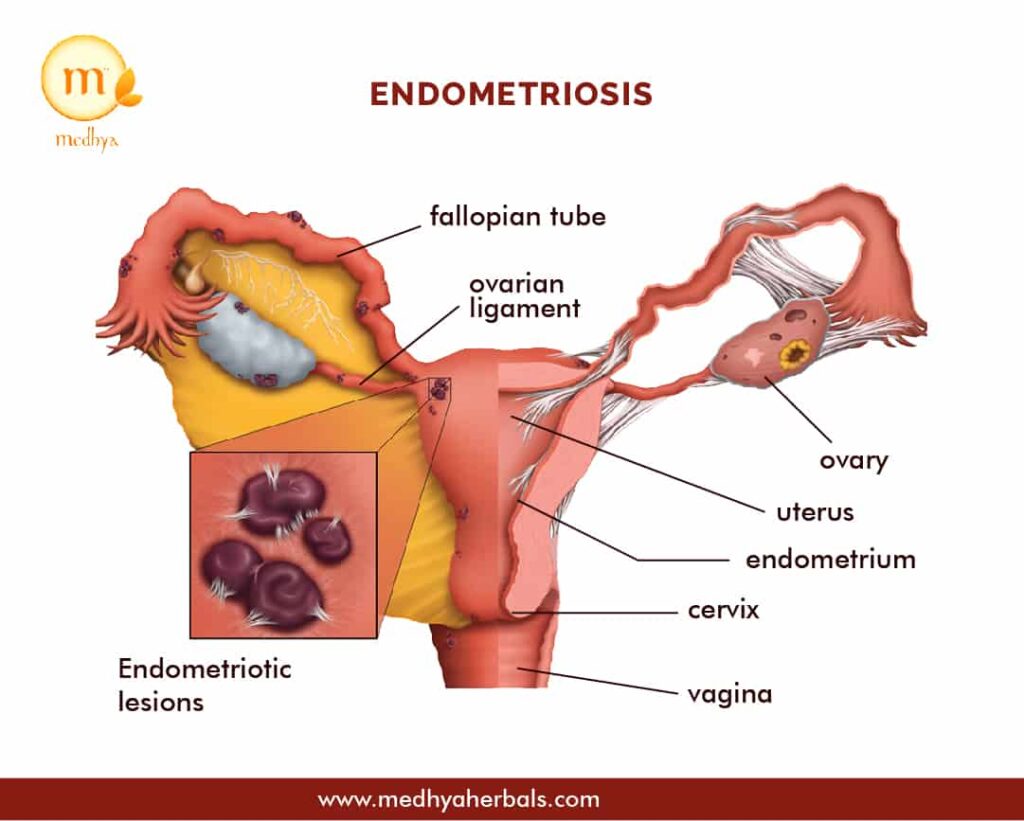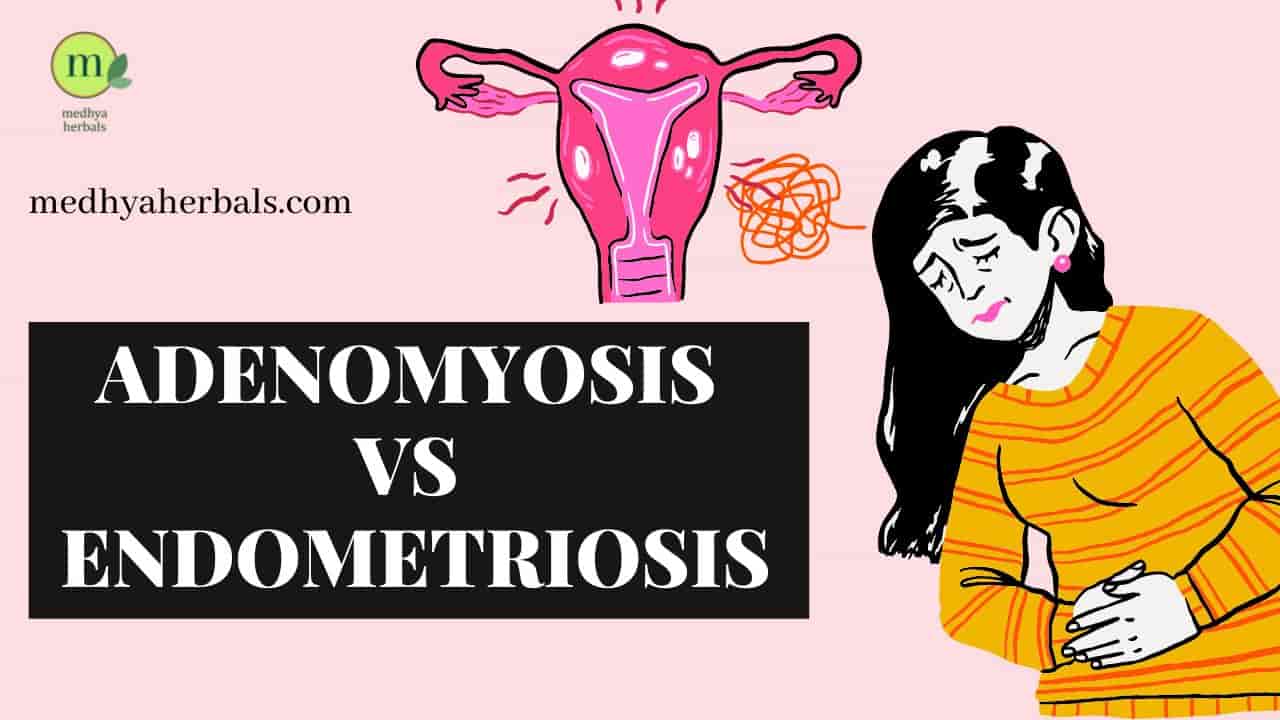Both adenomyosis and endometriosis are diseases of the endometrial tissue that lines the uterus. However, they occur in different ways and present with some different symptoms.
A significant difference between adenomyosis and endometriosis is where and how the abnormal endometrial tissues shed. In adenomyosis, these excessive tissues grow and shed on or inside the actual muscle of the uterus rather than on the inner wall, while in endometriosis the abnormal endometrial tissues grow and shed on the outside of the uterus.
While adenomyosis and endometriosis are two different conditions, it has been observed that women in advanced stages of any of these conditions usually have other condition also present. One research study indicated that nearly 40% of women diagnosed with adenomyosis also had endometriosis.
In addition, one may also have presence of uterine polyps, uterine fibroids, PCOS and or presence of ovarian cysts.
Adenomyosis Vs Endometriosis
Here’s a detailed video on Adenomyosis vs Endometriosis. Here you will find the common similarities, differences and Ayurvedic treatment approach for these two conditions.

In the early stages of adenomyosis and endometriosis, one may not experience any symptoms and hence the conditions can get unnoticed or misdiagnosed till it advances to higher severity level.
The symptoms of adenomyosis and endometriosis can vary from woman to woman, but the most common symptom is pelvic pain.
What is Adenomyosis
In adenomyosis, endometrial-like cells grow in the muscles of the uterus. These cells follow the menstrual cycle and bleed every month. The walls of the uterus thicken, which can cause pain and heavy bleeding.
Adenomyosis usually appears in women in their 30s or beyond. It can also be commonly observed in women, who have had deliver specifically cesarean section. For women in their perimenopause, adenomyosis can often be accompanied by uterine fibroids and uterine polyps.

Adenomyosis Symptoms
- Enlarged uterus due to the growth of uterine or endometrial fibroid and adenomyosis
- Heavy or prolonged menstrual bleeding involving dark, brownish red colored and clotted menstrual flow
- Premenstrual syndrome (PMS) and Severe menstrual cramps that start 2-3 days before period and subside once regular flow is established
- Pain during intercourse
- Pressure or bloating in the abdomen
- Frequent urination and pain during micturition
- Constipation or diarrhea
- Dysmenorrhea: Muscle cramps in the thighs and legs
- Pain in the pelvic area, lower abdomen and lower back
- Anemia, fatigue and dizziness due to heavy periods
- Fertility problems, difficulty in conceiving, Infertility in extreme cases
- Irregular Periods
- Frequent urinary tract infection
- Risky pregnancy, premature delivery or premature shedding of the endometrium
- Endometriosis and Uterine Fibroids present secondary to adenomyosis
- Endometrial Uterine polyps
What is Endometriosis
In endometriosis, endometrial lining cells grow outside the uterus. This tissue is commonly found in the ovary, which supports the ligaments of the uterus, and in the pelvic cavity. There they follow their menstrual cycle and bleed monthly. This can cause pain and affect fertility.
Endometriosis usually occurs in adolescents and women of childbearing age.

Endometriosis Symptoms
- Severe period cramps. The diagnosis of endometriosis should be considered especially, if a patient develops painful periods after years of pain-free menstrual cycles
- Excessive pain or cramping is experienced during sexual intercourse
- Lower back pain that worsens during menstruation
- Pain in the rectum and painful bowel movement may occur depending on the location of the endometrial implants
- Repeated miscarriages, infertility and inability to conceive
- Pain during urination, passage of red urine (during menstruation)
- Short Menstrual Cycle (less than 21 days) leading to Early or Frequent periods
- Heavy Bleeding or Menorrhagia
- Clotted menstrual blood flow
- Spotting or Bleeding in between periods
- Fatigue
- Nausea and vomiting
- Poor Mental Health leading to Emotional Distress, Anxiety, Depression, and Mood Swings
- Digestive issues such as gas, bloating, stomach pain (endo belly), diarrhea or constipation that worsens during menstruation
- Fever
Takeaway
Both adenomyosis and endometriosis are progressive conditions, thus they become more painful and difficult to treat in advanced stages. Both conditions can severely affect fertility and quality of life in women. That’s why it is important to get proper diagnosis and early treatment.
Early intervention will not only reduce the intensity of symptoms but also make it easier and faster to reverse adenomyosis and endometriosis. Ayurvedic treatment is highly effective to support your hormone balance, restore fertility and give you permanent relief from endometriosis and adenomyosis with herbs, diet and yoga.
If you are struggling with Adenomyosis and Endometriosis, consider Ayurvedic treatment at Medhya Herbals. Our Ayurvedic doctors will develop your personalized treatment plan to naturally reverse the condition and prevent surgery.


Hi,
I have an enlarged endometrium without atypia (08/02/2023). I also have for many years 80% of the symptoms of endometriosis described on your website (never undiagnosed in me) and 3 fibroids (one 5 cm and two small). The doctor at the hospital prescribed me progesterone for 6 months. Due to the fact that I consider taking progesterone as unjustified (I have it at a good level 23-24 day of the cycle 13.50 – progesterone level) and my English is not very good. Therefore, I would like to ask how much does your treatment cost and do you use such drugs as e.g: Kanchaner guggule, Chandreprapha Bati, Yograj Guggule, ? or your own mixes?
PS I'm after one panchacarma 2 years ago, it helped me a lot for the whole psychophysical state.
Best,
Elisabeth
Hi Elisabeth, yes we use whole herbs as Kanchnar Guggulu, Amla, Ashoka..as per the body type and specific requirements of the patient. Currently, we have a promotion for consultation for $49 only. We will be providing you with Ayurvedic diagnosis and health protocol that you can begin following. Please make an appointment in here.